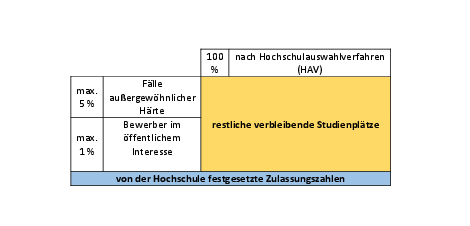Admission restriction
This page contains automatically translated content.
- Bachelor of Architecture (DoSV)
- Bachelor of Psychology (DoSV)
- Bachelor of Urban and Regional Planning (DoSV)
- Teaching degree for elementary school (local selection procedure)
- Master of Clinical Psychology and Psychotherapy (local selection procedure)
- Master Psychology(local selection procedure)
Selection procedure (Bachelor and teaching degree)
Who gets a study place?
The selection is based on a fixed procedure and is carried out in the same way by all universities:
After the application deadline, in a first step - the so-called main procedure - all applicants are grouped according to certain characteristics and assigned to one or more lists - hereinafter referred to as quotas .
The applicants on these quotas are sorted (ranked) according to specific criteria (see below), which vary depending on the quota. Only the best applicants in each quota receive a place. The applicant who is the last to receive a study place in the respective quota forms the so-called admission limit. The rank number on which this applicant stands is the so-called borderline rank. The value of the relevant selection criterion of the last applicant to be admitted forms the so-called limit value, also known colloquially as the "numerus clausus"(NC).
Selection quotas
Most study places are awarded in the university's selection process. However, some study places are reserved for special groups of applicants.
The overall distribution at a glance (Bachelor)
Applicants with an average grade of at least 2.0 and a waiting period of at least 1 semester were admitted to the Industrial Engineering and Management degree programme in the main procedure. Applicants with an average grade of 2.0 - without a waiting period - were selected by lot.
This means that
- all applicants with an average grade of 1.9 were admitted.
- Of the applicants with an average grade of 2.0, only those with at least 1 semester of waiting time were admitted.
- Of the applicants with an average grade of 2.0 and no waiting period (waiting period = 0), only those who had the luck of the draw were admitted.
Admission to the Industrial Engineering and Management degree programme is granted in the main procedure to those who have at least 6 half-years of waiting time and also at least an average grade of 2.7.
This means that
- all applicants with a waiting period of 7 half-years* were admitted.
- Of the applicants with a waiting period of 6 semesters, only those with an average grade of at least 2.7 were admitted.
*Due toa change in the legal regulation, no more than seven semesters of waiting time will be included in the calculation of the waiting time with immediate effect (see §5 HSchulZulG HE). Waiting periods of more than seven semesters therefore no longer improve the chances of obtaining a study place.
Selection procedure (Master)
The overall distribution at a glance (Master)
Succession and lottery procedure
After the main procedure has been completed, there are often still some unfilled study places and a succession procedure is carried out. The rejection notices are therefore only sent out after the succession procedure.
In some cases, a few study places remain unfilled even after the succession procedure has been completed. These are then drawn by lot. In most cases, these are places for which applicants have subsequently withdrawn their acceptance. Those who have not previously applied for this degree programme can also take part in the lottery procedure. However, the chances of obtaining a place are often very slim.
Legal information
Special quotas in detail
Special application situations
Go-Link of this page: www.uni-kassel.de/go/zulassungsbeschraenkung

